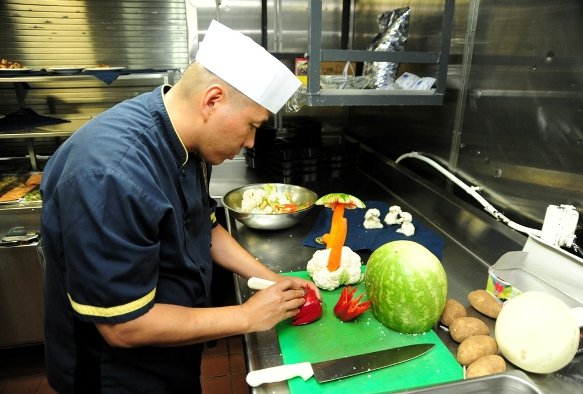Navy Culinary Specialists (CS) are Navy enlisted men and women who feed over 300,000 of their fellow sailors onboard US Naval Vessels and at Navy shore installations worldwide.
It is the Navy Culinary Specialist who “feeds the fleet.”
Culinary Specialists manage and operate US Navy messes and galleys, and living quarters established to accommodate and subsist naval personnel.
Navy Culinary Specialists not only prepare menus and meal plans, but they also prepare and serve those meals.
In addition, military Culinary Specialists maintain food service spaces and associated equipment in a clean, safe, and sanitary condition. This includes storerooms and refrigerated spaces.
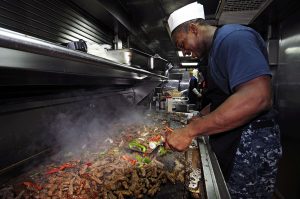
The responsibility of maintenance, management, and oversight of quarters afloat and ashore also falls to Navy Culinary Specialists.
Related Article – Army Culinary Specialist (MOS 92G): Career Details
The Navy Culinary Specialist (CS) rating originated from two rates, Steward (SD) and Commisaryman (CS), in the early days of the Navy.
In 1975, the Navy merged the Steward (SD) and Commisaryman (CS) rates and changed the name to Mess Management Specialist (MS) until 15 January 2004, when Mess Management Specialist (MS) became Culinary Specialists (CS).
Approximately 7,500 Culinary Experts serve in the United States Navy worldwide.
Navy Culinary Specialists also serve onboard submarines. However, their rate is Culinary Specialist (Submarines), or the Navy rate of CSS. They must go through the same training as do Culinary Specialists, but must also attend four weeks of Basic Enlisted Submarine School in Groton, Connecticut, upon Navy Culinary Specialist “A” school.
The ASVAB score required to be a Culinary Specialist (Submarine) is also different. The CSS must have an ASVAB score of AR (Arithmetic Reasoning) + MK (Math Knowledge) + EI (Electronics Information) + (General Science) = 200 or VE (Verbal Expression) + AR (Arithmetic Reasoning) + MK (Math Knowledge) + (Mechanical Comprehension) MC = 200.
The Sea/Shore rotation of a Culinary Specialist (Submarine) also differs from that of Culinary Specialists.
Navy Culinary Specialists also operate messes for the President of the United States in the White House and at Camp David.
Related Article – Navy Jobs List: A List Of All 71 Ratings In The Navy
Jump To A Section
Requirements and Qualifications
To become a Navy Culinary Specialist, there are specific requirements and qualifications that you must meet:
- Must be a member of the US Navy.
- Must be between the ages of 18 and 39.
- No record of adversely adjudicated drug abuse offenses.
- Must have an Armed Forces Vocational Aptitude Battery (ASVAB) score of VE (Verbal Expression) + AR (Arithmetic Reasoning) = 82
Training and Career Path
Prior to becoming a Navy Culinary Specialist, you must first become a US Navy Sailor. Recruits accomplish this via successful completion of Navy Recruit Training, commonly referred to as Boot Camp.
Related Article: Navy Height And Weight Standards
All sailors attend Boot Camp at the Recruit Training Command, Great Lakes (RTC Great Lakes).
Located at Naval Station Great Lakes in North Chicago, Illinois, in Lake County. RTC Great Lakes is commonly referred to as “The Quarterdeck of the Navy.”
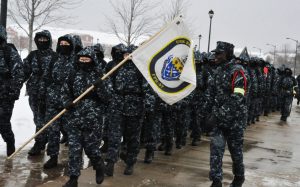
Boot Camp is 10 weeks long. During these 10 weeks, the Navy will teach you the basic skills required of all US Sailors.
Related Article – Is Navy Boot Camp Hard?
Navy Culinary Specialist Class “A” School
After Boot Camp, Navy Culinary Specialists attend Navy Culinary Specialist (CS) Class “A” School at the Joint Culinary Center of Excellence at Fort Lee, Virginia.
Navy Culinary Specialist Class “A” school is approximately five weeks long.
During Navy Culinary Specialist “A” School training, sailors learn food preparation, nutrition, and dining service through both group instruction and practical application.
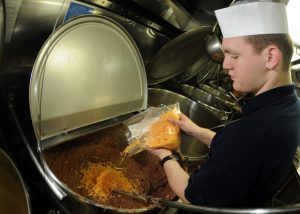
Besides Culinary Specialist Class “A” technical school, the Navy expects and encourages Navy Culinary Specialists to complete self-paced Non-Resident Training Courses (NRTC) and relative Personnel Qualification Standards (PQS) when they get to the fleet to enhance their knowledge and increase their promotion opportunities.
Navy Culinary Specialists should also pursue warfare qualifications depending on their duty station, such as:
- ESWS (Enlisted Surface Warfare Specialist)
- EAWS (Enlisted Aviation Warfare Specialist)
- Submarine Warfare (SSW) – Enlisted
In addition, The Navy provides online training to qualified Navy Culinary Specialists through their Credentialing Opportunities On-Line website, referred to as Navy COOL.
Advanced culinary-related training is available to Culinary Specialists as their Navy career progresses.
How Much Are Navy Culinary Specialists Paid?
Like all other enlisted personnel (in all branches), the Navy bases a sailor’s pay on their rank and length of service.
Navy Culinary Specialists may be entitled to other forms of compensation including basic allowance for housing (BAH), base allowance for subsistence (BAS), and billet pay (sea pay, flight pay, submarine pay, etc.) if eligible.
Related Article: Navy Ranks And Pay
What’s Life Like as a Navy Culinary Specialist?
Navy Culinary Specialists work in kitchens, dining areas, food service storerooms, and living and bachelor quarters aboard ships, construction battalions, shore bases, and designated aircraft.
The work is primarily physical, and Culinary Specialists must work as part of a team. The work is often in close quarters and often under adverse conditions.
Culinary Specialists work in the “heart of the ship.”
A Navy Culinary Specialist’s responsibilities vary and can include:
- Menu management.
- Food preparation.
- Mess, kitchen, and dining facilities operations.
- Operation and management of shipboard living quarters.
- Operation of shore-based hotel-type quarters.
- Serve as personal food service specialists in Commanding Officers’ and Admirals’ messes.
- Financial record management.
- Maintain subsistence inventories using storeroom management procedures.
- Provide hospitality and catering services during official command receptions and ceremonies.
- Serve as a flight attendant aircrewman on designated aircraft.
Related Article – Air Force Flight Attendant (1A6X1): Career Details
Navy Culinary Specialists do in fact, feed the fleet, worldwide. How well a Culinary Specialist does his or her job has a direct effect on a ship’s morale and the quality of life of her crew.
Life as a Navy Culinary Specialist requires a hard-working sailor not afraid to sweat or work odd (and long) hours.
“We’re up by 3 a.m. to start preparing breakfast to be served by 6 a.m. Some of our CSs have to report on lower-base to prepare meals and have to walk to work every morning,” says CS2 Roel Cabellero, a Culinary Specialist assigned to the Trident Inn Galley at Naval Base Kitsap-Bangor. Washington.
CS2 Cabellero also stresses how important time management is for Navy Culinary Specialists. “Time management is very important in the galley. You have a kettle full of chicken that takes about 45 minutes to cook, but the potatoes have to be seasoned too. So you look at your staff and see that one-third of your kitchen was sent to the lower-base galley, and you realize you don’t have enough hands.”
“Even with all the different tasks I have set before me, the meal must come out right and on time.”
Typical Rotation
Sailors in specific jobs (or rates as the Navy refers to them) must adhere to a Sea/Shore rotation based on their rate.
During a 20-year career in the Navy, Culinary Specialists will spend about 60 percent of their career at sea, and 40 percent assigned to shore stations.
Specifically, the Sea/Shore rotation for Navy Culinary Specialists is:
| Tour | Sea Tour | Shore Tour |
|---|---|---|
| First Tour | 55 Months (4.5 Years) | 36 Months (3 Years) |
| Second Tour | 54 Months (4.5 Years) | 36 Months (3 Years) |
| Third Tour | 48 Months (3 Years) | 36 Months (3 Years) |
| Fourth Tour | 36 Months (3 Years) | 36 Months (3 Years) |
| Fifth Tour | 36 Months (3 Years) | 36 Months (3 Years) |
| Sixth Tour | 36 Months (3 Years) | 36 Months (3 Years) |
| Seventh Tour | 36 Months (3 Years) | 36 Months (3 Years) |
Culinary Specialists who have completed four sea tours will serve 36 months at sea followed by 36 months on shore until retirement.
Note that some overseas assignments count as sea tours.
Shipboard life and life on shore duty are drastically different. The Navy expects Culinary Specialists, as they do all of their sailors, to adapt and meet the challenges presented by these different environments.
Here are a few reviews we happened across on indeed.com from Navy Culinary Specialists:


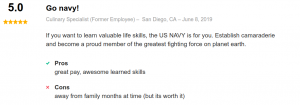

Navy Culinary Specialists enjoy the same benefits as do all Navy personnel, such as the opportunity to travel the world, unlimited opportunities for learning and advancement, and control over their career.
Related Article: 20 Reasons to Join the Military (and 7 reasons not to)
Civilian Career Opportunities
Civilian career opportunities for Navy Culinary Specialists abound. These include chef, server, food prep worker, food service supervisor, food service manager, sous chef, line cook, prep cook, restaurant manager, and a host of others.
This is especially true if the sailor took full advantage of the on-the-job (OJT) training opportunities and educational opportunities offered and afforded them during their naval service.
The United States Military Apprenticeship Program (USMAP) also allows Culinary Specialists to complete their civilian apprenticeship requirements while on active duty.
These apprenticeships include:
- Bakers
- Chefs and Head Cooks
- Cooks, Institution and Cafeteria
- Cooks, Restaurant
- Food Service Managers
National certifications and licensing programs available to Navy Culinary Specialists through Navy COOl funding include:
- Certified Culinary Administrator
- Certified Culinary Educator
- Certified Dietary Manager
- Certified Executive Chef
- Certified Master Chef
- Certified Professional Food Manager
- Grocery Manager Certification
- Personal Certified Executive Chef
- Registered Dietitian
If you are considering the US Navy, enjoy cooking and helping people, a career as a Navy Culinary Specialist might just be for you.
Who knows? You might just wind up cooking at the White House!
References
Navy Culinary Specialists Reviews
- Gas Turbine Systems Technician (GSM and GSE): Career Details - June 18, 2024
- Interior Communications Electrician (IC): 2023 Career Details - June 18, 2024
- Religious Program Specialist (RP): 2023 Career Details - June 18, 2024
General FAQ
What does a culinary specialist do in the Navy?
Culinary Specialists in the Navy ensure that Naval vessels and shore installations stay fed. They operate messes and galleys, planning, preparing, and serving meals.
How much does a culinary specialist make in the Navy?
The Navy pays personnel according to their rank and time in service. Currently, a new sailor with less than two years in service can expect a monthly base pay of about $1,900 per month before allowances and incentives.
How long is Navy A-School for culinary specialist?
After boot camp, training to become a Culinary Specialist in the Navy is about 5 weeks long. Those who plan to work in submarines will also attend 9 weeks of submarine school in Groton, Connecticut.
How do you qualify as a chef for the Navy?
To become a Culinary Specialist, you’ll need a minimum combined score of 82 on the Verbal Expression and Arithmetic Reasoning on the ASVAB. To work on submarines, you’ll need to score higher on the Electronics, Math, and Science portions
How much time to Navy chefs spend at sea?
Navy Culinary Specialists can expect to spend about 60 percent of their career on Sea Rotation.

